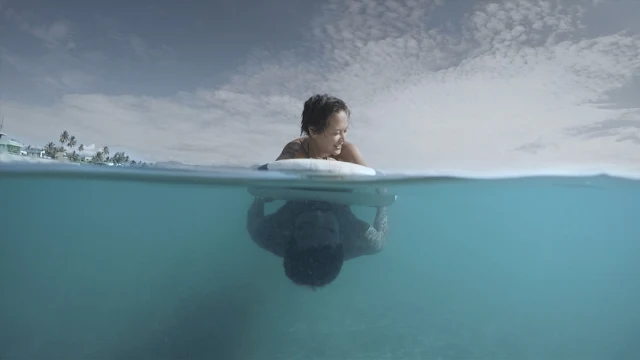 Beach boys
Beach boysCritics fault Mario Cornejo's Apocalypse Child for its formless almost motionless script, as if the premise (that Ford (Sid Lucero) is the bastard child of Francis Ford Coppola, conceived when the director was filming Apocalypse Now in Baler, Aurora Province), its development and resolution, were the raison d'etre for the film.
I disagree. In my book the premise is just an excuse for some lovely filmmaking, with a cast of attractive actors giving relaxed performances in one of the most beautiful seaside spots in the world.
I enjoyed Cornejo's debut feature Big Time (2005), a Filipinized Tarantinoesque caper film only looser livelier; this if anything is a more difficult challenge--to persuade us to spend time with these four or five folks without resorting to crime-thriller tactics, jawdropping plot twists, gratuitous gunplay.
No; instead of the premise one must focus on the characters: on Ford a surfer bum skimming through life in more ways than one, on Rich (RK Bagatsing) who is literally rich (newly elected congressman, son of the town patriarch), on Serena (Gwen Zamora) Rich's drop-dead gorgeous fiancee, on Chona (Ana Abad Santos) Rich's personal secretary and Ford's much-too-young freespirited mother, and on Fiona (Annicka Dolonius) Ford's live-wire girlfriend.
The relationships Cornejo traces between his characters is much like the waters of Baler: beautiful surface alternately translucent and reflective, harboring hidden currents. Ford and Rich grew up together like brothers--almost lovers someone puts it--but for some reason have recently experienced a rift between them. Serena is a classic example of the wealthy politician's trophy wife, only with a skeleton or two in her closet; she clearly loves Rich, but when she and Ford meet you sense powerful sexual pheromones reacting.
Chona you might say embodies the spirit of Baler: she's fond of spinning semi-truthful tales about herself and her town to, I don't know, either entertain listeners or make herself seem more interesting (perhaps pinning her down on exactly why she does this might help explain the film). Fun to listen to her tales of course but in a sense they're entirely unnecessary--she's already a fascinatingly young mother (only fourteen years older than Ford) who occasionally manages to shock her Bohemian son and his friends with her casual freewheeling spirit.
Fiona you have to love; that's not a suggestion or imperative, just something that happens over time while watching her. She's affectionate funny impudent intimate sexy; in bed with Ford you can believe the two have spent time together, know each other's body well. She's also strong, stubbornly honest, unafraid to say exactly what she feels (and apparently she feels plenty)--the perfect foil to Ford's self-obsessed sense of entitlement.
If the film has a model it's probably Come Back to the Five and Dime, Jimmy Dean, Jimmy Dean, Robert Altman's adaptation of Ed Graczyk's play, about a town that remembers the filming of George Stevens' Giant and the production's biggest star James Dean. Beyond the structural and thematic similarities (a small town unable to move past its memories of a famous film shoot; a bastard child unable to move past the shadow of his filmmaker father*) the pictures couldn't be more different: Altman's film (with cinematography by Pierre Mignot) is all gossamer moonshine and candlelight, with pane after pane of picture-window mirrors through which the camera plunges into the past; Cornejo's film (cinematography by Ike Avellana) treats the sea itself as a mirror, diving in and out and occasionally bobbing on the water, revealing both the submerged and the surfaced (a disapproving critic called the lighting 'washed out;' I prefer the terms 'sundrenched' and 'dreamlike' and call it a clever marriage of content and visual style).
Cornejo's film is also not a little kinkier, with oddly fluid notions about relationships--Rich for one seems to be pushing Serena to sleep with Ford, why we're not sure (A voyeuristic desire? A sadomasochistic impulse? An act of penance?). There's the hint of a suggestion (skip the rest of this paragraph and the next paragraph if you plan to see the film) that Ford's real father is Rich's, the two being really brothers (someone mentions that Rich's father often treated Ford as a favorite), and a curious note of maternal tenderness between Chona and Rich (are they both her sons?). Ultimately we learn that Rich and Ford are not related, but the tension is such between them (they're easily the most intense couple onscreen) that blood relation seems like an irrelevant issue--in one way or another, they're inextricably linked.
Interesting how Cornejo maintains a casual tone, how he scatters little plot points along the way but doesn't explain or resolve all (Why given her past does Rich still want to marry Serena? What really happened between Ford and Rich and Rich's father? Why does Chona act like Rich's nanny--his mother almost? Who won the surfing competition anyway?). Interesting too the heavy marijuana use; if this picture were made a year later it might end with everyone lined up against a wall and executed by vigilantes, or worse both cast and crew lined up and executed before the film was finished.
It's as if Cornejo after setting up so many characters in a fairly elaborate storyline decided to jettison most of it three-fourths of the way through, leaving us with what he meant to give us all along: a mere excuse for some lovely filmmaking with a cast of attractive actors, in one of the most beautiful seaside spots in the world. Not exactly a monumental reason to see the picture but in my book reason enough.
*(It's also charming if a bit unlikely that Ford's notoriety should arise from being the bastard child of the film's director. If he were the son of Marlon Brando that would be different, but only a true film geek for better or worse would blame Coppola)
First published in Businessworld 10.27.16

No comments:
Post a Comment